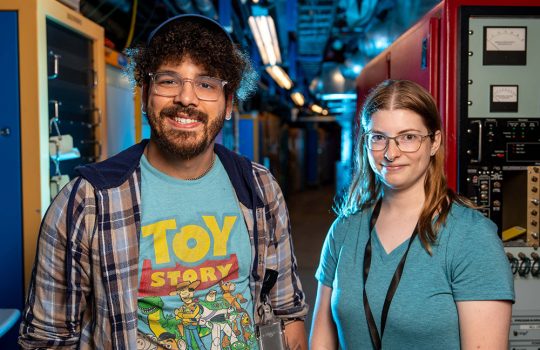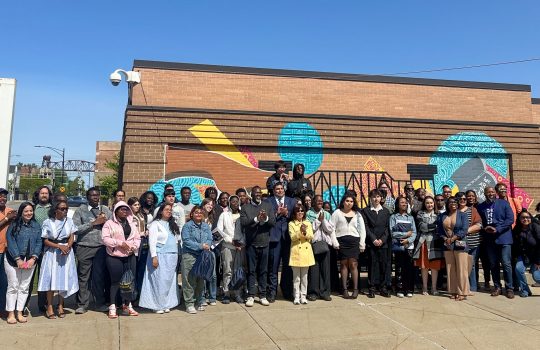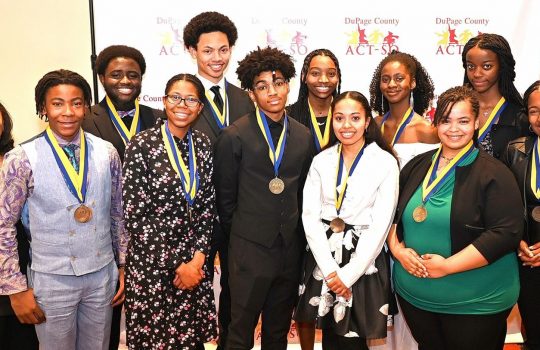This isn’t your average field trip. This month, more than 6,000 high school students participating in Hands-on Particle Physics Masterclasses will have the chance to form national or international scientific collaborations, just like real particle physicists do.
With the help of particle physicists, about 400 students from across the United States will analyze data from large particle collider experiments at CERN, the European Center for Nuclear Research. Most students will participate in this activity at universities and research institutes near their schools.
Classroom groups will discuss their findings via videoconference with other groups of students from across the country or across the globe. Physicists at Fermi National Accelerator Laboratory, including the laboratory’s deputy director, Young-Kee Kim, will help moderate videoconferences.
“This is a great opportunity to give students a deeper understanding of particle physics,” Kim said. “I hope this program will inspire them.”
This year high school students from around the world will participate in the international Hands-on Particle Physics Masterclass program, which began in Europe in 2005 and has expanded into the United States, South Africa and Brazil. Scientists at more than 100 universities and laboratories in 23 countries, including 22 institutions in the United States, will host students.
Students in the United States will participate through QuarkNet, a national program that unites high school students, physics teachers and particle physicists.
The opportunity to experience state-of-the-art research in an authentic environment will give students insight into the international organization of modern research. At the same time, they will learn about the building blocks of our universe through presentations by scientists involved in particle physics research.
“The Masterclass gives students the opportunity to understand the way physicists do high-energy physics,” said Jeff Rylander, instructional supervisor for the science department at Glenbrook South High School in Glenbrook, Ill. Rylander brought eight of his students to Argonne National Laboratory for a Masterclass last year and worked with a particle physicist from Fermilab.
“They appreciated looking at real data and interacting with a real physicist,” he said.
Summer Blot, now a physics student at the University of Chicago, attended the Masterclass last year with her QuarkNet group at Mills E. Goodwin High School in Richmond, Va. “It was neat that after only about an hour or two of learning how to do it, we were able to try analyzing data,” she said. “It made me realize that this is really what I want to do.”
Most students have to wait until graduate school to do that kind of data analysis, Blot said. “The fact that I have experience with it starting my first year is amazing to a lot of people. It gave me an advantage.”
This year’s lectures will discuss the Large Hadron Collider, the particle accelerator about 17 miles in circumference at the border of Switzerland and France. Students will analyze visual displays of real data collected at LEP, the previous large particle accelerator at CERN, and simulated data produced by the ATLAS experiment at the Large Hadron Collider.
The Hands-on Particle Physics student research days take place under the central coordination of Physics Professor Michael Kobel, Technical University of Dresden, in close cooperation with the European Particle Physics Outreach Group and with the support of the Helmholtz Alliance “Physics at the Terascale,” and the German Federal Ministry of Education and Research BMBF.
QuarkNet is funded by the National Science Foundation and the U.S. Department of Energy.
For editors:
The European Particle Physics Outreach Group is an independent committee of representatives of CERN member states and the research laboratories CERN and DESY. The committee’s goal is to make particle physics more accessible to the public. For more information: http://eppog.web.cern.ch/eppog/
For more information on the Hands-on Particle Physics Masterclasses: http://www.physicsmasterclasses.org
International schedule: http://www.physicsmasterclasses.org/mc/schedule.htm
U.S. schedule: http://cosm.hamptonu.edu/vlhc
For more information on QuarkNet and the Fermilab Education Office: http://www-ed.fnal.gov/ed_home.html



